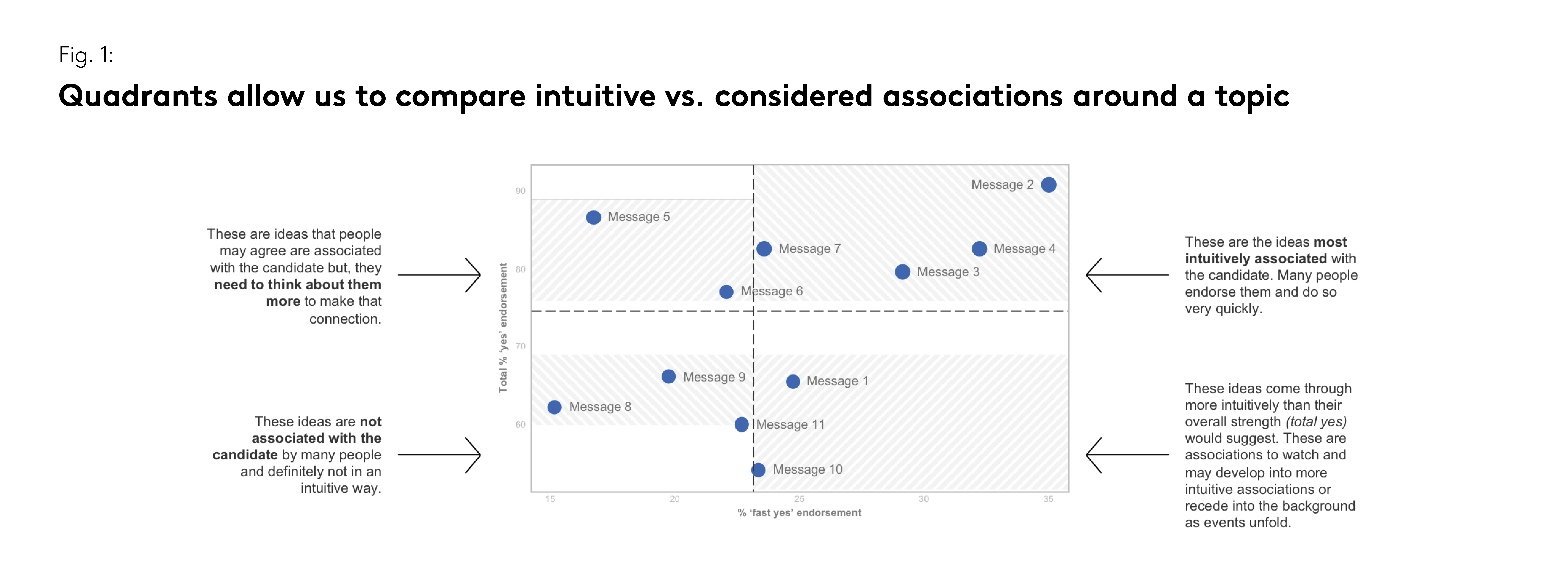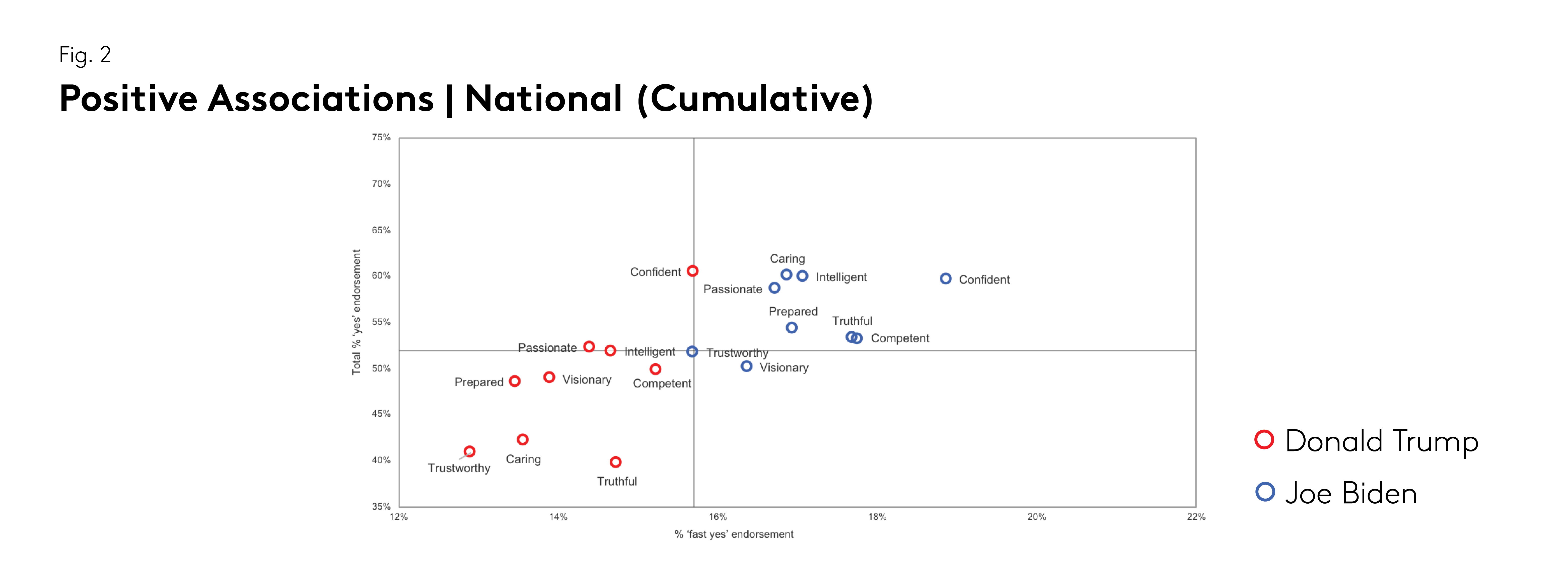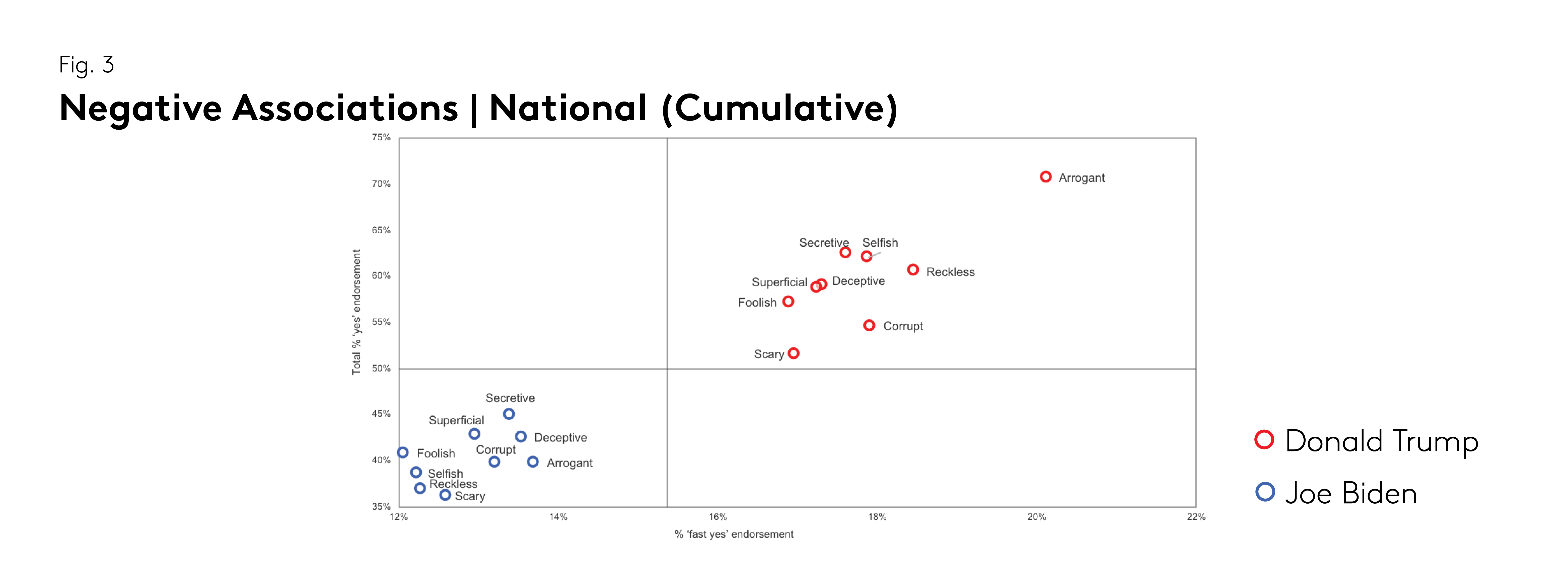Emotions, measured using reaction-time techniques, are an accurate way to measure people’s intentions – be it a presidential race or brand selection. Intuitive Association, a technique which factors the speed of people’s response as well as their responses themselves, provides an unfiltered view of people’s feelings and their likely behaviors.
Numerous studies in neuroscience and psychology have shown how emotions influence voting. Functional magnetic resonance imaging (fMRI) studies of healthy participants have shown that the amygdala is involved not only in evaluations of trustworthiness from faces (Winston et al., 2002) but also in the evaluation of facial attractiveness (Winston et al., 2007) and other social traits (e.g. responsibility, intelligence, and competence; Todorov & Engell, 2008). Further studies have shown that in actual electoral races, candidates with facial and vocal traits that are perceived as “competent” gain more voters(e.g., Berggren, Jordahl, & Poutvaara, 2010; Klofstad,2016; Laustsen, 2014; Olivola & Todorov, 2010; Todorov, Mandisodza, Goren, & Hall, 2005).
Kantar’s Neuroscience Practice has been collecting and interpreting implicit reactions to presidential candidates across 4,000 US consumers since August. (Four 4 waves of 1,000 each):
- Wave 1 – August 27 - 30
- Wave 2 – September 23 - 27
- Wave 3 – October 1 - 4
- Wave 4 – October 14 - 18
Using reaction-time technique, Kantar tested people’s reaction to Trump and Biden on both positive and negative attributes.
Positive attributes: Confident, Competent, Intelligent, Trustworthy, Passionate, Caring, Visionary
Negative attributes: Arrogant, Secretive, Selfish, Corrupt, Foolish, Deceptive, Superficial
Candidate’s strengths and weakness were assessed by looking at the total percent of people who associated with the attribute as well as those who associated with the idea very rapidly (based on their reaction times). The quadrant in Fig. 1 below highlights implicit strengths and weakness of the topic studied (in this case, 2020 presidential candidates).

Implicit reactions to positive emotions
At a spontaneous level, Biden is associated with all positive attributes while Trump is considered borderline confident. Notably, the previously cited study, conducted across multiple countries, shows that candidates who are rated as “competent” have a 70% chance of winning (Todorov, et al). Within Kantar’s study, 53% consider Biden competent while 50% associate Trump as competent at an overall level, indicating that the election will be close in some states.
Trump is associated with all negative attributes(Fig.2) at a spontaneous level compared to none for Biden. Neuroscience studies have shown that increase in negative attribute association leads to decrease in trust levels, leading to a decrease in loyalty. Our analysis shows a 7-point gap on Trustworthy between Biden (50%) and Trump (43%).

Gen Z (18-24 years), seniors and women are important segments in this year’s election given that Trump had support from these groups in the previous election as seen in Fig. 3. These groups could swing the election. Over 50% of the Gen Z population considered the racial and social justice movement to be one of the most important campaign issues and over 70% are angry and frustrated about the current situation in the US. This has contributed to a tenfold increase in new voter registration in this group. This is important because Gen Z favors Biden over Trump on Competence (11-point lead) and associate Trump with all negative attributes spontaneously.

Among seniors (65+), Biden is favored and has a 7-point lead over Trump on Competence. Based on Implicit Associations, 65% of this segment are fearful of COVID-19since they are among the most vulnerable; their support for Biden reflects the disappointment with the current administration’s handling of the crisis. Biden is also favored among women (by a 5-point lead). Women overindexed on issues related to COVID-19 and getting the economy back on track compared to men, key factors for many in deciding which they will give their vote.
Implications for Marketers
While the outcome of the election itself will surely have an impact on marketers in 2021, the results of this study have broader implications. While traditional methods of research using rational processing are critical inputs to understanding consumers more deeply, reaction-time techniques can add insightful nuance and measure the emotions behind consumers’ decisions and behaviors.
Learn more
Click here to access a full, detailed report of these findings and to learn how we can help you better understand your consumers during this unprecedented time.

